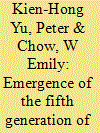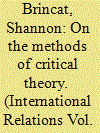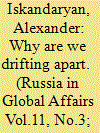|
|
|
Sort Order |
|
|
|
Items / Page
|
|
|
|
|
|
|
| Srl | Item |
| 1 |
ID:
083257


|
|
|
|
|
| Publication |
2008.
|
| Summary/Abstract |
The Hu Jintao regime is likely to remain in power until the Eighteenth National Congress of the Communist Party of China (CPC) in late 2012. It must, however, pick or groom a suitable elite and leaders to succeed Hu. The successors need to learn to navigate within the safe zones of a series of dialectical models to maintain the mainstream market-economy line of the CPC leadership within the context of Chinese Communism.
|
|
|
|
|
|
|
|
|
|
|
|
|
|
|
|
| 2 |
ID:
162488


|
|
|
|
|
| Summary/Abstract |
In this article, the introduction to this Special Issue, we underline the importance of the dynamics of misrecognition for the study of world politics. We make the case for shifting the focus from ‘recognition’, where it has long been cast in social, political and, more recently, International Relations theory, to misrecognition. We do so by returning to the original theorisation of misrecognition, Hegel’s dialectic of the master and servant. Our point of departure is not only that the desire for recognition is key social dynamic, but that the failure to obtain this recognition is built into this very desire. It is a crucial factor for understanding how international actors behave, including, but not only, states.
Thus understood, the desire for recognition is not simply a desire for social goods, for status or for statehood, but for more agency – more capacity to act. We explore the logic of misrecognition and show how the international system is a symbolic structure that is ordained by an unrealisable ideal of what we call ‘sovereign agency’.
|
|
|
|
|
|
|
|
|
|
|
|
|
|
|
|
| 3 |
ID:
094321


|
|
|
|
|
| Publication |
2009.
|
| Summary/Abstract |
This article illustrates the importance of negativity within the dialectical method, aiming to bring clarity to what has been rendered unnecessarily mystical within recent revisions of dialectics, particular in the conception of "meta-dialectics." The negative element in dialectics, where in the movement of sublation the subject remains undetermined and nonidentical, is argued to be the productive moment in the dialectical movement that leads to open-ended and ongoing processes of change. The article argues that considerable conceptual difficulties arise if one attempts to counterpose negative dialectics to positive dialectics and particularly in interpretations of Hegel's Logic and Adorno's Negative Dialectics that attempt to do so. The two moments of positivity and negativity are shown to be mutually related. If conceived in this manner, dialectical analysis can provide radical insights into processes of social change in world politics that are, and remain, open ended.
|
|
|
|
|
|
|
|
|
|
|
|
|
|
|
|
| 4 |
ID:
113818


|
|
|
|
|
| Publication |
2012.
|
| Summary/Abstract |
This article offers a reconstruction of the methodological tools pioneered by the first generation of the Frankfurt School (FS) and how they have been adapted in the contemporary project of emancipation in Critical International Relations Theory (CIRT). It is argued that the praxeological and methodological commitments of the early FS are of continuing utility in the post-positivist turn in IR theory. The paper also argues that CIRT has made significant advances on the original programme of CT developed by Horkheimer in the early 1930s. In particular, it is contended that the alleged pessimism typically associated with the later work of the early FS can be overcome if critical analysis looks beyond the state to those possibilities of emancipation pregnant within the global processes of world politics. Here the work of CIRT is argued to offer a number of advances on the sociology of the early FS, which was problematically confined to the examination of Euro- and state-centric possibilities for emancipation.
|
|
|
|
|
|
|
|
|
|
|
|
|
|
|
|
| 5 |
ID:
134392


|
|
|
|
|
| Summary/Abstract |
‘Postcolonial studies’ is the term given to the study of diaspora and the ideology of colonialism. Since the 1970s, when postcolonial studies was termed ‘Third World’ literature, and the 1980s, when it became ‘Commonwealth’ literature, the persistence of the framework of centre and margin, coloniser and colonised, has endured as a lens with which to view human identity and cultural expression. However, the relationship of postcolonial studies to international development is less well explored. Much of postcolonial studies is concerned with articulating patterns of gain, loss, inclusion, exclusion, identity formation and change, cultural evolution and human geographical dispersal in the wake of the after-effects of colonial rule. Postcolonial critics examine texts and images in order to make inferences about the significance of cultural identity and expression under these conditions. Often this is with a diachronic view of history. International development studies offers postcolonial critics a synchronic perspective on both the policy and materiality of political ideologies affecting cultural identity and expression. This paper looks at how the relationship between postcolonial and international development studies might be furthered in a dialectical exchange. Postcolonial critics such as Said and Pollard et al offer a critical understanding that informs policy making in international development contexts.
|
|
|
|
|
|
|
|
|
|
|
|
|
|
|
|
| 6 |
ID:
110783


|
|
|
|
|
| Publication |
2011.
|
| Summary/Abstract |
Dialectics remains an underutilized methodology in contemporary IR theory, which represents a significant limitation to the study of world politics, particularly in under-standing processes of transformation and change - an oversight that this article intends to redress. This article has two primary goals. First, it aims to reconstruct and build upon the small but robust debate concerning the validity of dialectics in IR that has been championed previously by Alker and Biersteker, and Heine and Teschke, respectively. Second, it contrasts dialectical and deterministic approaches to IR, as exemplified in Coxian Critical Theory and neo-realism, as a means to showcase the merits of the former as an approach to the study of social change in world politics. The ultimate aim of the article is to offer the groundwork of a social-relational dialectical approach to world politics that is focused on the intersubjective engagements between human beings, which can be developed in future research. Through such an analytic, the dialectical processes in social life are shown to be open-ended and the article rejects any understanding of 'inevitable' progress/regress or teleological end point. On the one hand, this account of dialectics promises greater analytical potential for understanding processes of change in world politics but, on the other, indicates the potential for the irrational toleration of contradiction and antagonism as an accepted feature of social life. Ultimately, the article argues that the skilled dialectician should emphasize human agency and intersubjectivity within a social-relational dialectical approach to world politics.
|
|
|
|
|
|
|
|
|
|
|
|
|
|
|
|
| 7 |
ID:
127048


|
|
|
|
|
| Publication |
2013.
|
| Summary/Abstract |
The paradigm of modernity, which implies the existence of nation states as the groundwork of political world order, often looks obsolete these days or at least out of fashion, despite its etymology. The originally successful attempt to pour new wine into old wineskins did not help: starting from a certain point both Europe and the Americas began to regard as the basis of nation states not ethnicity, but rather ways of people's self-organization irrespective of their ethnic or cultural background, race or religion. However, even this dramatic transformation has not made the modernity vision of politics less outdated. Today it is contrasted with the postulate that the contemporary world is moving towards globalization, internationalization and cosmopolitanization of everything around - from decision making in politics and the economy to the mechanisms of cultural interaction.
|
|
|
|
|
|
|
|
|
|
|
|
|
|
|
|
|
|
|
|
|